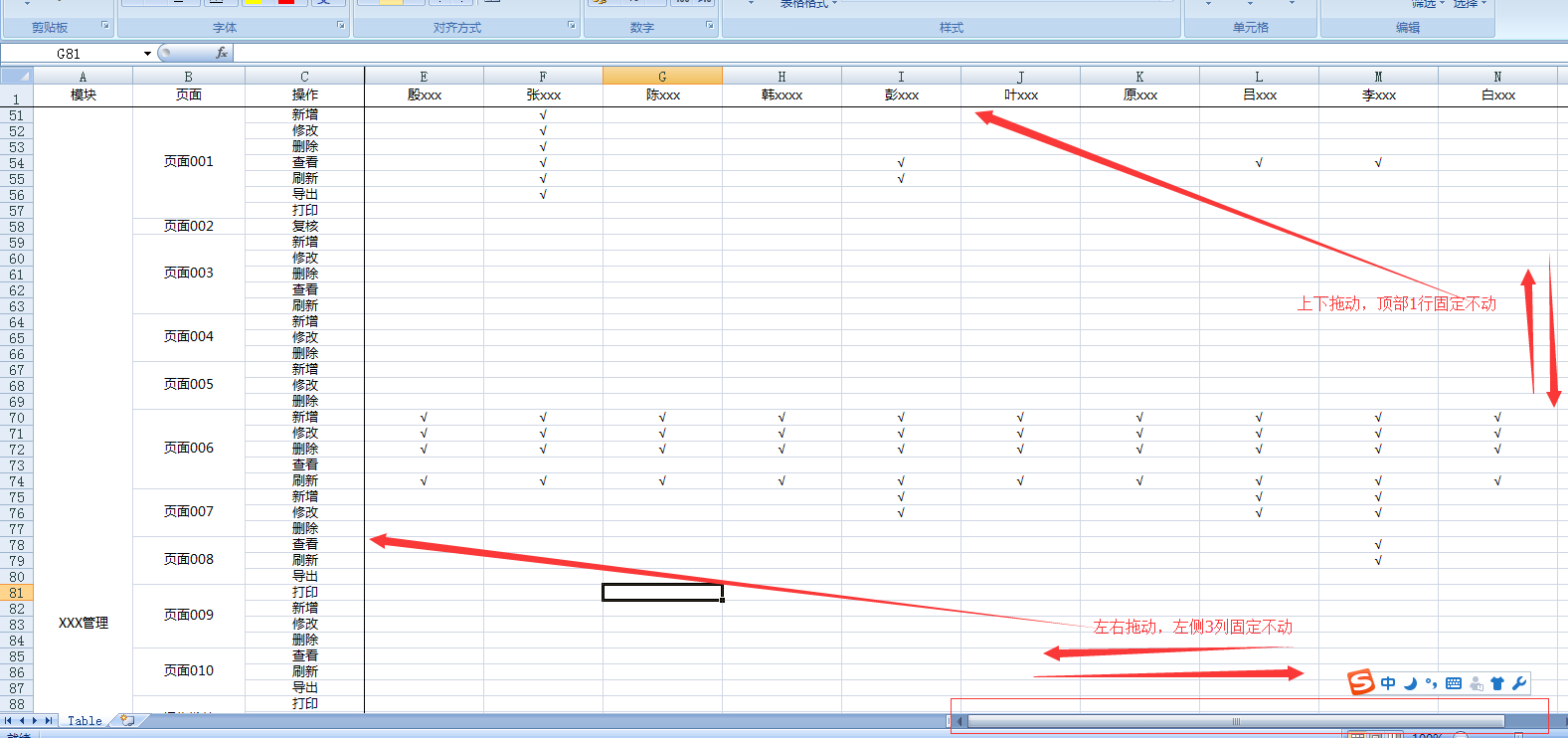分享使用NPOI导出Excel树状结构的数据,如部门用户菜单权限
大家都知道使用NPOI导出Excel格式数据 很简单,网上一搜,到处都有示例代码。
因为工作的关系,经常会有处理各种数据库数据的场景,其中处理Excel 数据导出,以备客户人员确认数据,场景很常见。
一个系统开发出来,系统要运行起来,很多数据要初始化,这个时候也是需要客户提供各种业务的基础数据。客户提供的数据中,其中除了word、pdf,最常见的就是Excel。
废话不多说,直接上图上代码:
如图,
左侧三列,作为 一个系统 所有菜单的树状结构。
其他列 以用户的信息(如用户名、登录名) 作为表头,需要注意的是,在整理数据进行导出时,需保证列名不能重复。

public static void DataTree(string path, DataTable table, int treeIndex = 10000) { using (FileStream fs = new FileStream(path, FileMode.OpenOrCreate, FileAccess.ReadWrite)) { IWorkbook workBook = new HSSFWorkbook(); //现在使用的仍然是生成Excel2003的Excel文件,由于03对行数(65535)和列数(255)有限制,所以当数据超出范围后难免出错 //ArgumentException: Invalid column index (256). Allowable column range for BIFF8 is (0..255) or ('A'..'IV') ... if (Path.GetExtension(path).Equals(".xlsx", System.StringComparison.OrdinalIgnoreCase)) { workBook = new XSSFWorkbook(); } string sheetName = string.IsNullOrWhiteSpace(table.TableName) ? "Sheet1" : table.TableName; ISheet sheet = workBook.CreateSheet(sheetName); IRow row = null; int colNum = table.Columns.Count; if (treeIndex < table.Columns.Count || treeIndex > 0) { colNum = treeIndex; } ICellStyle cellCenterStyle = GetCenter(workBook); int beginNum = 1;//排除列头,从1开始 //处理表格列头 row = sheet.CreateRow(beginNum - 1); for (int i = 0; i < table.Columns.Count; i++) { string strVal = table.Columns[i].ColumnName; ICell cell = row.CreateCell(i); cell.SetCellValue(strVal); cell.CellStyle = cellCenterStyle; row.Height = 350; sheet.AutoSizeColumn(i); } //处理数据内容 for (int i = 0; i < table.Rows.Count; i++) { row = sheet.CreateRow(beginNum + i); row.Height = 250; for (int j = 0; j < table.Columns.Count; j++) { string strVal = table.Rows[i][j].ToString(); ICell currCell = row.CreateCell(j); currCell.SetCellValue(strVal); currCell.CellStyle = cellCenterStyle; sheet.SetColumnWidth(j, 256 * 15); } } for (int i = 0; i < colNum; i++) { List<int> lstColWidth = new List<int>(); string currVal = string.Empty; string nextVal = string.Empty; for (int j = beginNum; j <= sheet.LastRowNum; j++) { currVal = sheet.GetRow(j).Cells[i].StringCellValue; int mk = j; if (!string.IsNullOrWhiteSpace(currVal))//排除 空值,空值不做合并处理 { for (int k = j + 1; k <= sheet.LastRowNum; k++) { nextVal = sheet.GetRow(k).Cells[i].StringCellValue; if (currVal != nextVal) { //因为k 累加所以导致当前值与下个值 不相同,所以记录 当前行数要 减去1 mk = k - 1; break; } else if (k == sheet.LastRowNum) //边界值,处理最后一行,则提前Break 并记录当前 k { mk = k; break; } } } if (mk != j)//排除 空值外,下个值的行数不等于当前行数,则需要合并 { sheet.AddMergedRegion(new CellRangeAddress(j, mk, i, i)); } //if (i == 0) //如果是第一列,则 垂直水平居中 { sheet.GetRow(j).Cells[i].CellStyle = cellCenterStyle; } //跳到执行下一个不同数据的行 j = mk; //记录列长度 lstColWidth.Add(DataLength(currVal)); } //设置列宽 int maxWidth = lstColWidth.Max() * 200; sheet.SetColumnWidth(i, maxWidth); } //固定列、行 滚动时不变 sheet.CreateFreezePane(3, 1, 3, 1); //写入数据流 workBook.Write(fs); } } private static ICellStyle GetCenter(IWorkbook workBook, short fontSize = 10) { ICellStyle cellStyle = workBook.CreateCellStyle(); IFont font = workBook.CreateFont(); font.FontName = "微软雅黑"; font.FontHeightInPoints = fontSize; cellStyle.SetFont(font); cellStyle.VerticalAlignment = VerticalAlignment.Center; cellStyle.Alignment = HorizontalAlignment.Center; return cellStyle; } /// <summary> /// 获取字符串长度(中文按2个字节长度) /// </summary> /// <param name="stringWithEnglishAndChinese"></param> /// <returns></returns> private static int DataLength(string stringWithEnglishAndChinese) { int lng = 0; for (int i = 0; i < stringWithEnglishAndChinese.Length; i++) { byte[] b = System.Text.Encoding.Default.GetBytes(stringWithEnglishAndChinese.Substring(i, 1)); if (b.Length > 1) lng += 2; else lng += 1; } return lng; }



 浙公网安备 33010602011771号
浙公网安备 33010602011771号